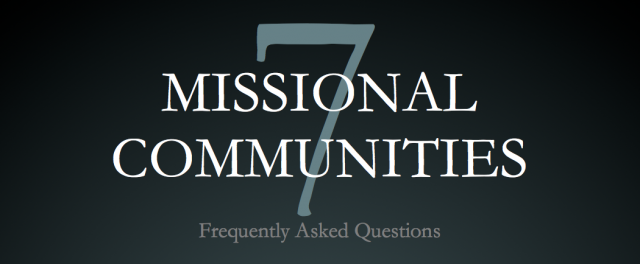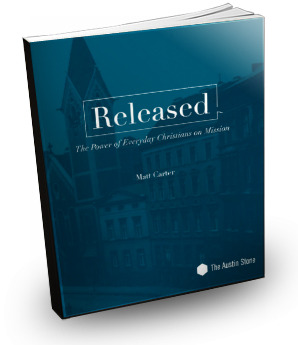
You can download a PDF of this post here: PDF
From Community Groups to Missional Communities
Before, we had what was called community groups. The idea behind community groups was that they were these little small groups that met for Bible study. They had some chips and some dips. And we called this community – Â small group Bible studies with some chips and some dips thrown in. That was a big win for us.
But we began to think differently. What if we challenged, trained and equipped our leaders, who would then in turn train, challenge and equip all our small groups not just to come together on a Tuesday night, eat some snacks, have a Bible study, pray and go home (all that stuff is cool)? What if we challenged them not just to do that, but to come together for the purpose of living radically on mission together?
What if we challenged them to come together for the purpose of being the church? What if we challenged them to come together for the purpose of living missionally and living incarnationally together as a group in their neighborhoods, in their workplaces, on their campuses? What would happen if we did that? We might actually make a difference in Austin, Texas in our lifetime.
Growing Restlessness in the American Church
There’s a growing sense of restlessness that I’m seeing in the American church. When my parents went to church, which was every single Sunday of my young life, here’s what their church experience looked like: We would go to the Sunday event. They tithed. They would serve in the nursery once a month. My dad was an usher sometimes, and, about once a month, he’d pass the offering plate. We prayed before meals. My parents would have a couple of quiet times a week.
That was it. That was their definition of Christianity. That was their Christian experience, because in their minds there was a group of people who did the ministry. These were the pastors and the teachers and the evangelists and the missionaries and the music guys. Then there were the people like them who sat in the pews and got fed by the professional Christians who did the ministry.
However, this generation – the 18- to 30-year-olds who are coming of age in the church today – they are not wired that way. This generation is not okay with sitting on the sidelines of ministry. They are hardwired to want to be a part of something bigger than themselves.
They are not afraid of challenge. They’re not afraid of getting outside of their comfort zone. They want to experience life for themselves. They want to see the world change, and they want to be a part of it. The reason this generation is leaving the church in droves right now in this country is because the vast majority of churches in this country haven’t figured that out.
Missional Communities-Expect Great Things from Your People
People in church right now, the people God is going to bring to future churches, are capable of doing more than you have ever dreamed they can do if you will just challenge them and give them the chance to do it.
They’re capable because the power that raised Jesus Christ from the dead is sitting in that single mom. The power that raised Jesus Christ from the dead is sitting in that young married couple. The power that raised Jesus Christ from the dead is sitting in that 65-year-old guy who has wasted his life making money for himself. Release people and raise the bar for what it means to live on mission.
As we as a church began to cast this vision for Missional Communities, for groups not just to gather but to live on mission together in the context that God has called them to, we’ve had people respond that want to make a difference for the kingdom. They have raised their hands and said, “I want to get in the fight.”
One family in particular sold their home and moved into an at-risk, under-resourced neighborhood in Austin. They bought several houses around them so that impoverished single moms could have transitional housing. He and his wife started a Missional Community whose purpose is to serve these single mothers, disciple and train these women, and to give these women hope.
They’re not just engaging in social justice or charity. They’re engaging in community development in their neighborhood, and they are changing the world. They’re seeing people come to Christ. They’re making a difference in the city of Austin.
If we had never challenged them, if we had never raised the bar for them, and if we’d never released him, if we’d never given him permission – “it’s okay for you to use your finances, your time, and your giftings outside of the four walls of this church,” there’s a really good chance this family spends the rest of their lives sitting in a chair in our sanctuary listening to sermons, singing songs, passing the offering plate, never knowing the thrill of giving their life away for Jesus Christ.
People are hungrier than you could ever dream to get in the fight. Challenge them, train them, and release them not just to come to church but to be the church.
 *Did you like this article? Check out Matt’s FREE eBook entitled Released: The Power of Everyday Christians on Mission.
*Did you like this article? Check out Matt’s FREE eBook entitled Released: The Power of Everyday Christians on Mission.
CLICK HERE to download your free copy.
[author image=”https://vergenetwork.org/wp-content/uploads/2011/10/Matt-Carter-FTC-230-bw.png” ]Matt Carter serves as the Pastor of Preaching and Vision of The Austin Stone Community Church, which has grown from a core team of 15 people to more than 7,000 Sunday attendees since the church began in 2002. He desires to see the church become an advocate for the welfare of the city of Austin has led to the creation of a network that exists to actively pursue the redemption and renewal of the city for the advancement of the gospel. The For the City Network provides a platform for organizational collaboration by offering physical space to local nonprofits and creating a funnel for volunteer engagement. In addition to pastoring at The Austin Stone, Matt is a cancer survivor, co-author of For the City, Creation Unraveled: The Gospel According to Genesis, and The Real Win (with NFL Quarterback Colt McCoy). Matt is also an active speaker for camps and conferences nationwide. He holds a Master of Divinity from Southwestern Baptist Theological Seminary. Matt is married to Jennifer, and they have three children.[/author]
[ads2]


